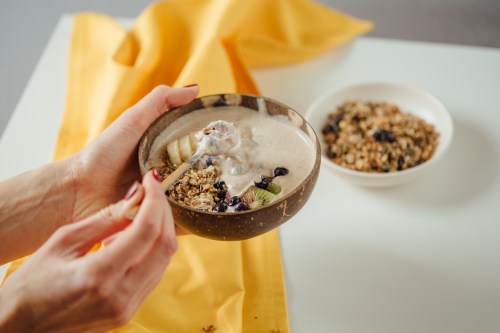Dr. Pimple Popper Swears By These 9 *Skintastic* Wellness Tips That Keep Her Face and Mind Clear
Celebrity dermatologists: They're just like us!

Sometimes, it's hard to imagine that your healthcare provider can empathize with, or even relate to, a health condition you have. But when renowned dermatologist Sandra Lee, MD, FAAD, affectionately known as "Dr. Pimple Popper," is not filming her hit TLC show of the same name, or racking up millions of views on her YouTube channel's "popping videos," she's managing a condition she encounters almost daily in her practice: eczema. (Talk about ultimate relatability.)
Eczema is a chronic skin condition that causes itchy, red, and dry patches of skin across the body. Not only can it be incredibly irritating—the itch quite literally never stops—it's also a frequently misunderstood condition, which can lead to feelings of isolation, sadness, or stress for those who have it.
But Dr. Lee is hoping to change that by raising awareness. Beyond talking about eczema on her various platforms, she has also recently partnered with the Moments of Clarity campaign for Opzelura—a new prescription non-steroidal cream to treat eczema. In the campaign, Dr. Lee tells the story of how she was diagnosed with eczema at a young age, and how she manages the itchy skin condition now as a healthcare professional, in the hopes that opening up will help others feel less alone.
We got the chance to chat with Dr. Lee to learn more about how she keeps her skin feeling healthy and itch-free, along with her other top wellness tips to stay popping in work and life.
What it's like to live with eczema
Surely, treating a condition that you also live with can be an interesting experience. So, we wanted to know what it's like to live with eczema and be someone who helps others manage their eczema, too.
"I think it certainly helps you to connect more with patients, especially every single time I see somebody with eczema,” says Dr. Lee. “One of the first things that I do is point out that I have it, too, so I understand what they are going through,” she adds. On the flip side, Dr. Lee says people may take her recommendations for treating eczema and relieving the itching and pain more seriously, because she often does those same things for her own skin. “It’s very relatable,” she adds.
Dr. Lee's 6 skin tips to keep itching at bay
Turns out, even the skin experts have a daily routine they incorporate to keep their complexion healthy and fresh, especially if they're living with a skin condition. For Dr. Lee, her steps are a little more eczema-specific, but they can also easily apply to you if your skin is dry, itchy, or flaky. With that said, here are her skin-saving tips.
1. Moisturize, moisturize, moisturize
In Dr. Lee’s book, moisturizing is the most important thing you can do when you have eczema. “It’s sort of like a non-negotiable…just like how you brush your teeth,” or do other healthy things every day, like drink water or go to the bathroom.
To help keep up this practice, Dr. Lee will bring a travel-size moisturizer everywhere she goes—trips included. “My skin just does not keep its moisture in as easily,” she adds. For eczema in particular, layering up on moisturizing methods is often recommended: for example, after you get out of the shower, apply an emollient (like Vaseline or Aquaphor) to damp skin, and then apply a thick moisturizer on top (like Eucerin or CeraVe, both of which are dermatologist-approved for eczema).
If you're in the market for a new moisturizer, try Eucerin Eczema Relief Cream ($13) or CeraVe Moisturizing Cream ($16).
2. Stay away from certain fabrics
“I definitely don’t wear wool sweaters, scarves, or wool anything, because that will set [my skin] off,” says Dr. Lee. While it’s not impossible to wear thicker fabrics to stay warm in the cooler weather, steering clear of certain materials that can exacerbate itching or dryness, like wool or synthetic fabrics like polyester, nylon, or spandex, might help your skin breathe and remain itch-free.
So, if you're planning to wear a cute wool sweater anytime soon, try wearing a long-sleeve shirt underneath so your skin doesn't directly touch the itch-inducing fabric.
3. Don't sit in sweat
Sweating is a common trigger for people with eczema, as the salt and other oils excreted from your sweat glands can lead to itching spells, redness, or irritation on your most sensitive patches.1 This is why, if you are prone to sweating when you work out or go outside, it’s best to towel off or dry your skin in other ways ASAP. (Break out the hairdryer if you have to.)
Another thing Dr. Lee keeps in mind: “We touch our face many times, especially when we are sweating," she says. “You know, you’re wiping the sweat and then start breaking out. I will have to stop and take a shower or wash my hands because that triggers me, too,” she adds.
4. Avoid dry air and dust
Environmental conditions like dry air (both indoors and outdoors) or allergens like dust can also set off eczema flares, so Dr. Lee suggests being super cautious about what your skin's exposed to, especially in your home.
“I know that if I’m moving things, like maybe in my garage or just trying to rearrange, maybe that’s why I also don’t like to clean…because the dust will set me off,” Dr. Lee says. In other words, if you know you'll be exposed to dust of any kind, try to wash your hands, change out of your clothes, or even shower off after a cleaning sesh, so anything lingering in the air won't stick to your skin.
Dry air is another no-no. "When I was in medical school on the East Coast studying late at night, I never really had a space heater before, but I had this space heater that was really dusty," and created lots of dry air, Dr. Lee recalls. "It made me completely break out in the middle of the night, and I had a test the next day, and I thought I couldn't go because of all the itching and lack of sleep," she adds.
To freshen up your space and prevent dry air, try an air purifier or humidifier, like the Canopy Portable Humidifier ($100).
5. Focus on triggers you can control
Sometimes, preventing eczema flare-ups is all about control. "In dermatology, a lot of people who come to see you have a feeling of a loss of control—you don't have control over your own skin or rash," Dr. Lee adds. So, she says, if you can do things that keep symptoms more in control (like avoiding certain triggering foods, environmental allergens, skincare products, etc.), you may also feel calmer and more confident in your skin.
6. Talk to your healthcare provider about treatment options
Traditionally, the main course of treatment for eczema involves topical creams with steroids. But for some people, these creams can cause side effects like loss of skin pigmentation, dryness, or worsening of symptoms when you stop using the product (also known as topical steroid withdrawal). This is why Dr. Lee is a big advocate for talking to your healthcare provider about other options if steroid creams don't work for you.
"There are so many new medications that we can use to help," says Dr. Lee, adding that she feels so much better and happier about using them for herself, too. "There's a higher safety margin with them, but they still work," she adds.
Other wellness tips Dr. Lee lives by
It's clear that popping pimples isn't Dr. Lee's only gig. There are plenty of other things the celeb dermatologist juggles daily, which means her wellness is of utmost importance. Here are some of her favorite things to do to stay well, both in body and mind.
1. She loves hanging out with friends
"My friends really make me realize that life's not quite so serious. In fact, because I have a lot of different things to juggle today, my best friend came over last night," says Dr. Lee. "It was kind of last-minute and not planned, but she spent the night, and then this morning I was like, 'Oh my gosh, I have so many things to do!' She made me realize it's all important, but it's not that important," she adds.
Spending time with friends can help you remember what's important in life and ground you in the present moment, which is crucial to feeling well. Dr. Lee says those hangouts, where there are no looming deadlines or expectations, are invaluable. "I also love spending time with my family and my cats. I have my cats sleeping at my feet," Dr. Lee adds.
2. She sticks to a morning routine, which, yes, includes sunscreen
When it comes to the morning wake-up call, Dr. Lee is just like us. She loves sticking to a routine, which includes applying sunscreen every day—it's the one skincare product she can't live without! Applying it every day, whether it's sunny or cloudy outside, is a non-negotiable in the same way that brushing your teeth, drinking water, or taking deep breaths is, she says.
"A lot of people are concerned with anti-aging," says Dr. Lee. "Sunscreen is going to help you with brown spots, blood vessels in their skin, and it's going to help you prevent skin cancer," she adds. While there are many different types of sunscreen on the market, it's typically advised to find something with an SPF of at least 30, and to reapply throughout the day.
We like Supergoop! Play Everyday Lotion SPF 30 ($20) and Anthelios Mineral Tinted Ultra Light Face Sunscreen Fluid SPF 50 ($40) by La Roche-Posay.
3. She prioritizes vulnerability and her mental well-being
Dr. Lee says that while eczema is not directly life-threatening, it can take a toll on your mental and emotional well-being, like acne or other skin conditions can. "It can really shape your personality, how you relate to others, and how you relate to the world," she says. "So, it's important to treat these things because they treat your mental state, as well."
As she's treating people with skin conditions every day (who may feel self-conscious or insecure about their skin's appearance), and hearing their emotional stories, she makes it a priority to practice vulnerability while protecting her mental health. "You have to treat people's mental state as much as you do their physical state," she says, which she certainly does as evidenced by how she interacts with people on her TV show and YouTube videos. She even watches her show back herself to remember the ways that eczema can affect someone's life.
To help support your mental well-being while living with a physical health condition, it can be helpful to open up to a trusted loved one, friend, or mental health professional, to learn ways to cope and practice self-love.
Despite being a "pop-lebrity," Dr. Lee is just like us
As a self-proclaimed "popaholic"—or pop-lebrity as we like to call her—Dr. Lee reminds people that skin health is not just about squeezing blackheads for viral online moments. It's also about managing underlying conditions like eczema, getting back to basics with skincare (hello moisturizer and sunscreen), and keeping your overall wellness in mind.
To learn more about Dr. Lee's partnership with Opzelura, visit www.mymomentsofclarity.com.
- Hodge BD, Sanvictores T, Brodell RT. Anatomy, Skin Sweat Glands. [Updated 2022 Oct 10]. In: StatPearls [Internet]. Treasure Island (FL): StatPearls Publishing; 2025 Jan-. Available from: https://www.ncbi.nlm.nih.gov/books/NBK482278/ ↩︎










